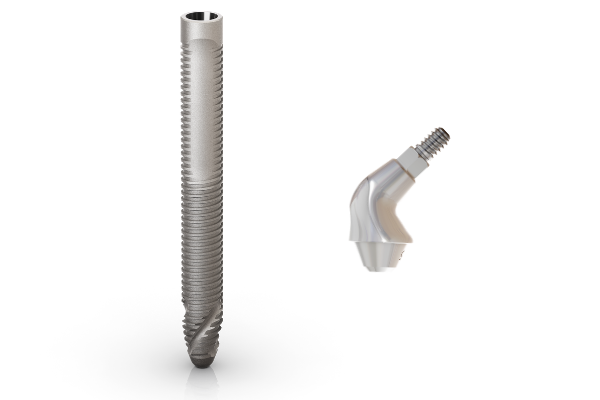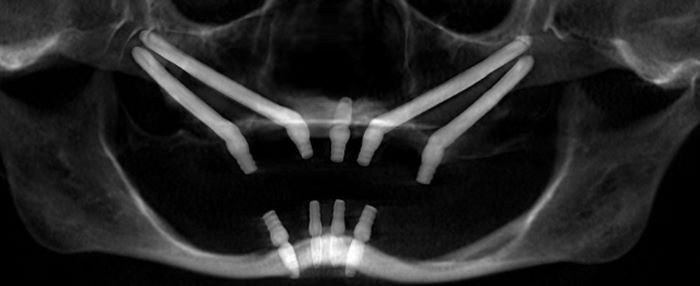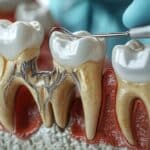How Much Does a Zygomatic Dental Implant Cost?
Regardless of how complicated a case is, New Teeth Now patients pay from $3,000 to $4,000 per zygomatic implant. If you’d like a quote for the full procedure, contact us for current pricing. Because zygomatic implants are so specialized, these fees are in addition to the procedure’s base price, which we will describe in more detail below. Anywhere between one and four zygomatic dental implants are used during a procedure, dependent on the extent of bone loss in the upper jaw.
Are Zygomatic Dental Implants Worth the Money?
Considering zygomatic dental implants are a fraction of the total cost of the full procedure, they are absolutely worth the investment to improve your overall well-being and oral health. For anyone researching full mouth dental implants for the first time, the price range from one provider to the next can be surprising.
New Teeth Now is an investment to improve quality of life and avoid the expense of maintaining damaged or failing teeth. Upkeep for advanced periodontal disease, for example, can add up quickly as treatments such as scaling and root planing will prolong the disease without curing it.
It's More Expensive to Wait Too Long
Without intervention, bone loss gets worse over time. Following any tooth extractions, the longer you wait, the more bone loss will occur. More bone loss often means you will need additional traditional or zygomatic implants to support your teeth.
Patients who have long endured issues such as periodontal disease often share how they regret investing so much time and money in a smile they never liked in the first place. When compared to single dental implants at a per tooth rate, replacing all of your teeth is more cost effective, averaging at only a third the cost of replacing one tooth with a dental implant.
We have spoken to many patients who have researched similar procedures and have been turned away by other oral surgeons due to bone loss. At New Teeth Now, our surgeons are renowned for their experience in full mouth restorations for patients who suffer from severe bone loss. It is very unlikely that we would not be able to help someone because of severe bone loss.

Who Is a Candidate for Zygomatic Dental Implants?
If you need half or more of your teeth replace with dental implants, or you suffer from advanced periodontal disease, then you’re a candidate for New Teeth Now. The New Teeth Now procedure requires medical clearance and access to your medical history to review disqualifying concerns unrelated to bone loss. Qualifying patients who have bone loss in the upper jaw are more likely to need zygomatic dental implants.
Patients from all over the country come to New Teeth Now because our oral surgeons excel as implant specialists for cases of severe bone loss. Most patients we see are aware of our reputation through referrals and patient testimonials.
We prioritize affordability and quality because we care deeply about our patients’ stories. Fortunately, zygomatic dental implants do not have a dramatic impact on the cost of the New Teeth Now procedure.
How Long Will Zygomatic Dental Implants Last?

What’s Included at the Base Price for the Procedure?
When you request an estimate from us on the website or over the phone, you’ll receive a price range to help you budget for the procedure. Once you have your consult, you’ll receive the final price with no hidden fees or surprises.
Unlike other offices, where the quality of care varies widely, we have a consistent reputation for excellence in performing implant restorations. This is especially notable for patients who have severe bone loss.
As already mentioned, the first quote you receive for New Teeth Now is for your total treatment from start to finish, with no additional fees added on later. This is the base cost. At other offices, you may need several quotes coming from each of the many professionals involved with your treatment.
However, our base estimate will already include all of the following:
- All extractions (if any)
- Traditional implants
- Abutments
- Professional general anesthesia
- Two sets of teeth (healing set and final set)
- Two years of follow-up care
These are all-inclusive with the base price. There is no charge based on the number of traditional implants or abutments you will need. Similarly, not needing extractions will not reduce the price of the procedure.
The primary factors affecting cost are related to severity of bone loss and the extent of intervention to create a secure base for your new prosthetics. At the consultation, your oral surgeon will be able to tell how much intervention is necessary due to bone loss.
Our pricing is not permanently set, as it can be affected by service and material expenses. Please contact us today to lock-in our current pricing for the year, and for additional information about the New Teeth Now procedure.
With Everything Else Included, Why Do Zygomatic Dental Implants Affect the Total Price?
The use of zygomatic dental implants in full mouth restorations is highly specialized and takes place in a sensitive area of the face near the eyes. To feel confident that you are receiving the best possible care, you will need the help of a qualified oral and maxillofacial oral surgeon who has experience placing zygomatic implants on a regular basis.
Unlike other facilities, our surgeons do not rely on implant guides. The placement of implants is intuitive. Not every mouth is the same. Choosing the appropriate angle and abutment requires years of experience.
The number of zygomatic implants, determined by the amount and location of bone loss, will also be a factor in the additional cost. Bilateral implants are used when severe bone loss is present on both sides of the upper jaw.
A quad zygoma implant procedure refers to the maximum number of zygomatic implants a patient can receive, where two zygomatic implants are used for both sides of the upper jaw.

Can Zygomatic Implants Be Placed in the Lower Jaw?
Zygomatic dental implants provide support by connecting the upper bridge to the cheekbone, or zygoma. This cannot be done from the lower jaw.
However, it is more common for extensive bone loss in the upper jaw to complicate a one-size-fits-all, restorative procedure like All-on-4®. Even with bone loss, the lower jaw has more bone to work from. Often, six implants will be used instead of four to provide adequate support.
As discussed, because our surgeons do not rely on guided implant systems, they are skilled at finding solutions and techniques to support your new teeth with the bone that you have. While not impossible, it is rarely the case that a patient with bone loss even in the lower jaw will need bone grafting in order to replace their bottom teeth.









